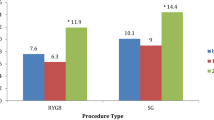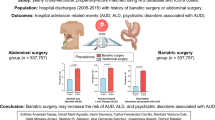ABSTRACT
BACKGROUND
Patients who misuse alcohol are at increased risk for surgical complications. Four weeks of preoperative abstinence decreases the risk of complications, but practical approaches for early preoperative identification of alcohol misuse are needed.
OBJECTIVE
To evaluate whether results of alcohol screening with the Alcohol Use Disorders Identification Test - Consumption (AUDIT-C) questionnaire—up to a year before surgery—were associated with the risk of postoperative complications.
DESIGN
This is a cohort study.
SETTING AND PARTICIPANTS
Male Veterans Affairs (VA) patients were eligible if they had major noncardiac surgery assessed by the VA’s Surgical Quality Improvement Program (VASQIP) in fiscal years 2004-2006, and completed the AUDIT-C alcohol screening questionnaire (0-12 points) on a mailed survey within 1 year before surgery.
MAIN OUTCOME MEASURE
One or more postoperative complication(s) within 30 days of surgery based on VASQIP nurse medical record reviews.
RESULTS
Among 9,176 eligible men, 16.3% screened positive for alcohol misuse with AUDIT-C scores ≥ 5, and 7.8% had postoperative complications. Patients with AUDIT-C scores ≥ 5 were at significantly increased risk for postoperative complications, compared to patients who drank less. In analyses adjusted for age, smoking, and days from screening to surgery, the estimated prevalence of postoperative complications increased from 5.6% (95% CI 4.8–6.6%) in patients with AUDIT-C scores 1–4, to 7.9% (6.3–9.7%) in patients with AUDIT-Cs 5–8, 9.7% (6.6–14.1%) in patients with AUDIT-Cs 9–10 and 14.0% (8.9–21.3%) in patients with AUDIT-Cs 11–12. In fully-adjusted analyses that included preoperative covariates potentially in the causal pathway between alcohol misuse and complications, the estimated prevalence of postoperative complications increased significantly from 4.8% (4.1–5.7%) in patients with AUDIT-C scores 1–4, to 6.9% (5.5–8.7%) in patients with AUDIT-Cs 5-8 and 7.5% (5.0–11.3%) among those with AUDIT-Cs 9–10.
CONCLUSIONS
AUDIT-C scores of 5 or more up to a year before surgery were associated with increased postoperative complications.


Similar content being viewed by others
References
Laine C, Williams SV, Wilson JF. In the clinic. Preoperative evaluation. Ann Intern Med. 2009;151(1):ITC1–15. quiz ITC16.
Tonnesen H, Rosenberg J, Nielsen H, et al. Effect of preoperative abstinence on poor postoperative outcome in alcohol misusers: randomised controlled trial. BMJ. 1999;318(7194):1311–16.
Tonnesen H, Nielsen PR, Lauritzen JB, Moller AM. Smoking and alcohol intervention before surgery: evidence for best practice. Br. J. Anaesth. Mar. 2009;102(3):297–306.
Tonnesen H, Petersen KR, Hojgaard L, et al. Postoperative morbidity among symptom-free alcohol misusers. Lancet. 1992;340(8815):334–7.
Tonnesen H, Kehlet H. Preoperative alcoholism and postoperative morbidity. Br. J. Surg. Jul. 1999;86(7):869–874.
Spies CD, Neuner B, Neumann T, et al. Intercurrent complications in chronic alcoholic men admitted to the intensive care unit following trauma. Intensive Care Med. 1996;22(4):286–293.
Spies C, Tonnesen H, Andreasson S, Helander A, Conigrave K. Perioperative morbidity and mortality in chronic alcoholic patients. Alcohol Clin Exp Res. 2001;25(5 Suppl ISBRA):164S–170S.
Tonnesen H. Alcohol abuse and postoperative morbidity. Dan Med Bull. 2003;50(2):139–160.
Shourie S, Conigrave KM, Proude EM, Ward JE, Wutzke SE, Haber PS. The effectiveness of a tailored intervention for excessive alcohol consumption prior to elective surgery. Alcohol Alcohol. 2006;41(6):643–9.
Bradley KA, Kivlahan DR, Bush KR, McDonell MB, Fihn SD. Variations on the CAGE alcohol screening questionnaire: strengths and limitations in VA general medical patients. Alcohol Clin Exper Res. 2001;25(10):1472–8.
Kip MJ, Neumann T, Jugel C, et al. New strategies to detect alcohol use disorders in the preoperative assessment clinic of a German university hospital. Anesthesiology. 2008;109(2):171–9.
Khuri S, Daley J, Henderson W, et al. The national veterans administration surgical risk study: risk adjustment for the comparative assessment of the quality of surgical care. J Am Coll Surg. 1995;180:519–531.
Khuri S, Daley J, Henderson W, et al. The Department of Veterans Affairs' NSQIP. The first national, validated, outcome-based, risk-adjusted, and peer-controlled program for the measurement and enhancement of the quality of surgical care. Ann Surg. 1998;228(4):491–507.
Hammermeister KE, Johnson R, Marshall G, Grover FL. Continuous assessment and improvement in quality of care. A model from the Department of Veterans Affairs Cardiac Surgery. Ann Surg. 1994;219(3):281–290.
Khuri SF, Henderson WG, Daley J, et al. Successful implementation of the Department of Veterans Affairs' National Surgical Quality Improvement Program in the private sector: The Patient Safety in Surgery study. Ann. Surg. Aug. 2008;248(2):329–336.
Wright SM, Craig T, Campbell S, Schaefer J, Humble C. Patient satisfaction of female and male users of Veterans Health Administration services. J Gen Intern Med. 2006;21(Suppl 3):S26–32.
Bush K, Kivlahan DR, McDonell MB, Fihn SD, Bradley KA. The AUDIT alcohol consumption questions (AUDIT-C): an effective brief screening test for problem drinking. Ambulatory Care Quality Improvement Project (ACQUIP). Alcohol Use Disorders Identification Test. Arch Intern Med. 1998;158(16):1789–1795.
Bradley KA, Bush KR, Epler AJ, et al. Two brief alcohol-screening tests from the Alcohol Use Disorders Identification Test (AUDIT): validation in a female Veterans Affairs patient population. Arch Intern Med. 2003;163(7):821–829.
Au DH, Kivlahan DR, Bryson CL, Blough D, Bradley KA. Alcohol screening scores and risk of hospitalizations for GI conditions in men. Alcohol Clin Exp Res. 2007;31(3):443–451.
Bryson CL, Au DH, Sun H, Williams EC, Kivlahan DR, Bradley KA. Alcohol screening scores and medication nonadherence. Ann Intern Med. 2008;149(11):795–804.
Kinder LS, Bryson CL, Sun H, Williams EC, Bradley KA. Alcohol screening scores and all-cause mortality in male Veterans Affairs patients. J Stud Alcohol Drugs. 2009;70(2):253–260.
Harris AH, Bryson CL, Sun H, Blough D, Bradley KA. Alcohol screening scores predict risk of subsequent fractures. Subst Use Misuse. 2009;44:1055–1069.
Bradley KA, Williams EC, Achtmeyer CE, Volpp B, Collins BJ, Kivlahan DR. Implementation of evidence-based alcohol screening in the Veterans Health Administration. Am. J. Manag. Care. 2006;12(10):597–606.
Smith PC, Schmidt SM, Allensworth-Davies D, Saitz R. Primary care validation of a single-question alcohol screening test. J Gen Intern Med. 2009;24(7):783–788.
National Institute on Alcohol Abuse and Alcoholism, US Department of Health and Human Services, National Institute of Health. Helping Patients Who Drink Too Much: A Clinician’s Guide (updated 2005 guide). Rockville, MD; 2007.
Bradley KA, Kivlahan DR, Williams EC. Brief approaches to alcohol screening: practical alternatives for primary care. J Gen Intern Med. 2009;24(7):881–883.
Seale JP, Boltri JM, Shellenberger S, et al. Primary care validation of a single screening question for drinkers. J Stud Alcohol. 2006;67(5):778–84.
Daley J, Khuri SF, Henderson W, et al. Risk adjustment of the postoperative morbidity rate for the comparative assessment of the quality of surgical care: results of the National Veterans Affairs Surgical Risk Study. J Am Coll Surg. 1997;185(4):328–40.
Spies CD, von Dossow V, Eggers V, et al. Altered cell-mediated immunity and increased postoperative infection rate in long-term alcoholic patients. Anesthesiology. 2004;100(5):1088–1100.
Spies CD, Lanzke N, Schlichting U, et al. Effects of ethanol on cytokine production after surgery in a murine model of gram-negative pneumonia. Alcohol Clin Exp Res. 2008;32(2):331–8.
Spies CD, Nordmann A, Brummer G, et al. Intensive care unit stay is prolonged in chronic alcoholic men following tumor resection of the upper digestive tract. Acta Anaesthesiol Scand. 1996;40(6):649–56.
Weed HG, Lutman CV, Young DC, Schuller DE. Preoperative identification of patients at risk for delirium after major head and neck cancer surgery. Laryngoscope. 1995;105(10):1066–8.
Litaker D, Locala J, Franco K, Bronson DL, Tannous Z. Preoperative risk factors for postoperative delirium. Gen Hosp Psychiatry. 2001;23(2):84–9.
Marcantonio ER, Goldman L, Mangione CM, et al. A clinical prediction rule for delirium after elective noncardiac surgery. JAMA. 1994;27(2):134–9.
Williams-Russo P, Urquhart BL, Sharrock NE, Charlson ME. Post-operative delirium: predictors and prognosis in elderly orthopedic patients [see comments]. J Am Geriatr Soc. 1992;40(8):759–67.
Warner DO. Tobacco dependence in surgical patients. Curr Opin Anaesthesiol. 2007;20(3):279–83.
Atherly A, Fink AS, Campbell DC, et al. Evaluating alternative risk-adjustment strategies for surgery. Am J Surg. 2004;188(5):566–70.
Deyo RA, Cherkin DC, Ciol MA. Adapting a clinical comorbidity index for use with ICD-9-CM administrative databases. J Clin Epidemiol. 1992;45(6):613–9.
Johnson SE, Newton WP. Resource-based relative value units: a primer for academic family physicians. Fam Med. 2002;34(3):172–6.
Williams EC, Peytremann-Bridevaux I, Fan VS, Bryson CL, Kivlahan DR, Bradley KA. The association between alcohol screening scores and health status in male veterans. Journal of Addiction Medicine. 2010;4(1):27–37.
Stata Statistical Software: Release Special Edition 10.1 [computer program]. College Station TX: Stata Corporation; 2007.
Martin MJ, Heymann C, Neumann T, et al. Preoperative evaluation of chronic alcoholics assessed for surgery of the upper digestive tract. Alcohol Clin Exp Res. 2002;26(6):836–840.
Miller PM, Spies C, Neumann T, et al. Alcohol biomarker screening in medical and surgical settings. Alcohol Clin Exp Res. 2006;30(2):185–193.
Moore RD, Bone LR, Geller G, Mamon JA, Stokes EJ, Levine DM. Prevalence, detection, and treatment of alcoholism in hospitalized patients. JAMA. 1989;261:403–7.
Poon A, Owen J, Gijsbers AJ. Identification of at-risk drinkers in an orthopaedic inpatient population. Aust. N. Z. J. Surg. 1994;64(11):775–9.
Williams G, Daly M, Proude EM, et al. The influence of alcohol and tobacco use in orthopaedic inpatients on complications of surgery. Drug Alcohol Rev. 2008;27(1):55–64.
Shourie S, Conigrave KM, Proude EM, Ward JE, Wutzke SE, Haber PS. Pre-operative screening for excessive alcohol consumption among patients scheduled for elective surgery. Drug Alcohol Rev. 2007;26(2):119–125.
Bradley KA, DeBenedetti AF, Volk RJ, Williams EC, Frank D, Kivlahan DR. AUDIT-C as a brief screen for alcohol misuse in primary care. Alcohol Clin Exp Res. 2007;31(7):1208–1217.
Rose HL, Miller PM, Nemeth LS, et al. Alcohol screening and brief counseling in a primary care hypertensive population: a quality improvement intervention. Addiction. 2008;103(8):1271–80.
Hawkins EJ, Kivlahan DR, Williams EC, Wright SM, Craig T, Bradley KA. Examining quality issues in alcohol misuse screening. Subst Abus. 2007;28(3):53–65.
Bradley KA, Williams EC, Achtmeyer CE, et al. Measuring performance of brief alcohol counseling in medical settings:a review of the options and lessons from the Veterans Affairs (VA) health care system. Subst Abus. 2007;28(4):133–149.
Acknowledgements
The authors greatly appreciate the VA Surgical Quality Data Use Group (SQDUG) and the VA Office of Quality and Performance (OQP), which shared their data with us for this project. The project would not have been possible without these data. The authors would like to further acknowledge SQDUG for its role as scientific advisors and for the critical review of data use and analysis presented in this manuscript.
Contributors
The authors would also like to thank Drs. Bevan Yueh and Emily Williams for important contributions to the design of the study and Mr. Jeff Todd-Stenberg for acquisition and merging of data.
Financial Support
The research reported here was supported by the Department of Veterans Affairs, Veterans Health Administration, Office of Research and Development and Health Services Research and Development (project IAC 06-021). Dr. Bradley is an investigator at the VA Northwest HSR&D Center of Excellence and at the Center of Excellence in Substance Abuse Treatment and Education, VA Puget Sound Health Care System, Seattle, WA.
Prior Presentation
A portion of this work was presented at the 2009 VA Health Services Research & Development National Meeting as an oral presentation and at the 2009 VA National Leadership Board Meeting and 2009 American Society of Anesthesiologists Meeting as a poster.
Conflict of Interest
The authors certify that we have no affiliation with or financial involvement in any organization or entity with a direct financial interest in the subject matter or materials discussed in the manuscript (e.g., employment, consultancies, stock ownership, honoraria).
Author information
Authors and Affiliations
Corresponding author
Appendix
Below is the link to the electronic supplementary material.
ESM 1
(DOC 102 kb)
Rights and permissions
About this article
Cite this article
Bradley, K.A., Rubinsky, A.D., Sun, H. et al. Alcohol Screening and Risk of Postoperative Complications in Male VA Patients Undergoing Major Non-cardiac Surgery. J GEN INTERN MED 26, 162–169 (2011). https://doi.org/10.1007/s11606-010-1475-x
Published:
Issue Date:
DOI: https://doi.org/10.1007/s11606-010-1475-x




